Degrees of Comparison, Finite Verbs, Non-Finite Verbs, Gerunds - Grammar - I Can’t Climb Trees Anymore | 9th EM English : Prose : I Can’t Climb Trees Anymore
Chapter: 9th EM English : Prose : I Can’t Climb Trees Anymore
Grammar - I Can’t Climb Trees Anymore
Grammar
Degrees of Comparison
Comparison
can be made using the three forms of an adjective.
Adjective
is a word that describes or qualifies a noun. It gives more information about a
noun.
eg. The
tiger is a strong animal. Meena is a girl.
There are
three degrees of comparison (1) Positive (2) Comparative (3) Superlative
eg. Kumar
is a kind man.
![]() eg. A tsunami is more destructive
than a cyclone.
eg. A tsunami is more destructive
than a cyclone.
eg. Mount
Everest is the highest peak in the world.
Read the following examples

The
Positive Degree is used to express or describe a quality.
The Positive Degree of an adjective states the characteristic of the noun.
·
It is a
tall building.
·
Mango is
sweet to taste.
The Comparative Degree is used when two things (or two sets of things) are compared.
·
This building is taller
than any other building.
·
Mango is
sweeter than pineapple.
The Superlative Degree is used when more than two things are compared.
·
This is the
tallest building.
·
Mango is the
sweetest fruit.
Examples
·
Prabhu is young. (Positive Degree)
·
Prabhu is younger than Amirtha. (Comparative Degree)
·
Prabhu is the youngest of all. (Superlative Degree)
A. Work with a partner and fill in the table with information about your locality. You may add more information, if necessary. When you finish filling the table, write a short paragraph comparing the two places.
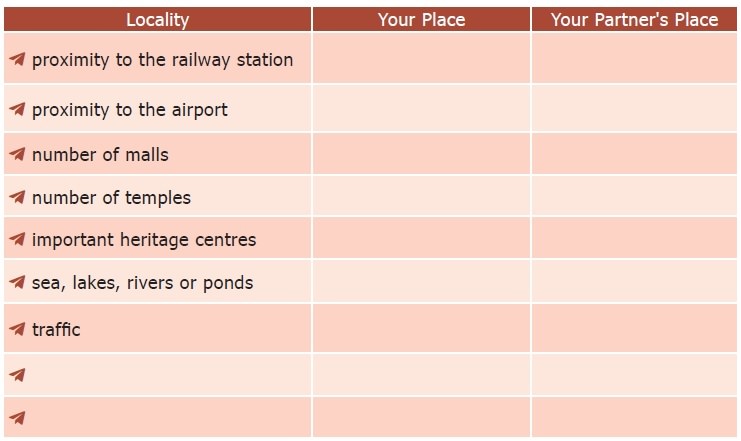
B. Give your opinion and compare the items in each picture using -er, more, less, or an irregular form. Use the words. You may form your sentences in more than one way.
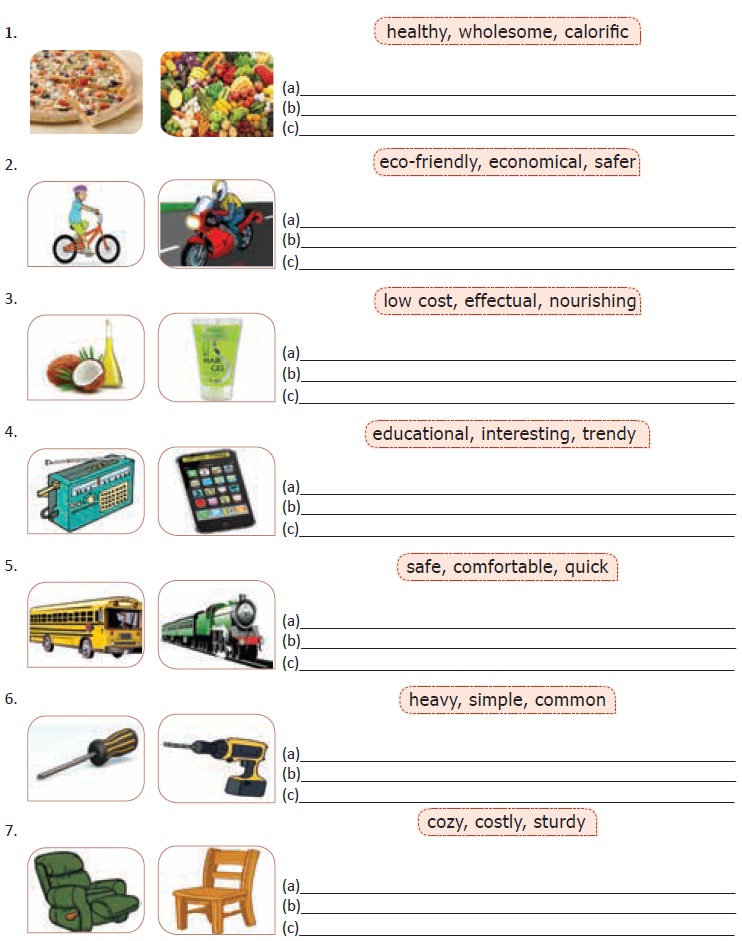
C. Look at the bar-graph. Write five sentences using the appropriate de-grees of comparison.
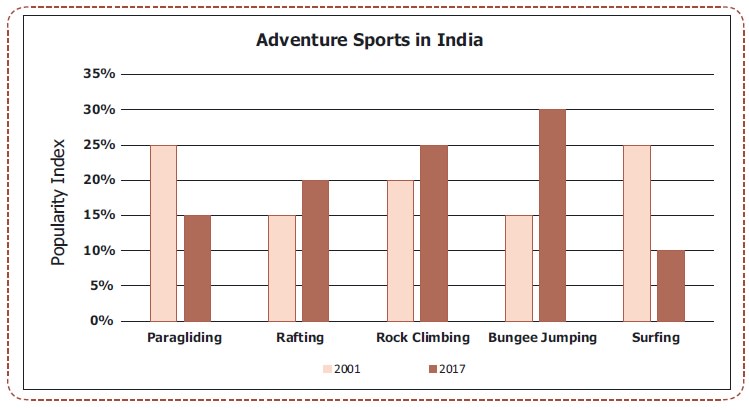
D. *Listen to the conversation between Leena
and her mother and list down a few new words. Using a dictionary find out the
meaning for those words.
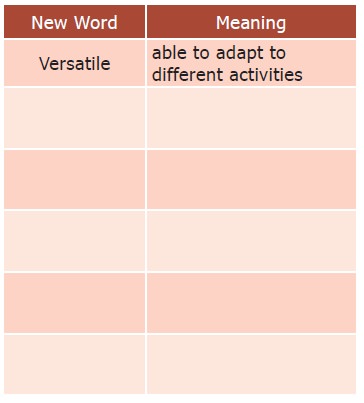
E. Just a Minute
The class
will be divided into groups of five. Each one of you will get a topic to speak
on, which will be related to the theme of the unit. A preparation time of one
minute will be given. Then, you have to speak for one minute continuously. The
teacher will ring the bell to signal the end of a minute. Next person in the
team will take over.
The
challenges of the one minute speech are to speak without
·
hesitation, stuttering and stammering.
·
pauses, gesticulations and repetitions.
·
deviating from the topic.
F. Work with a partner.Match the words and pictures by writing the numbers in the space provided.Use an encyclopedia to find out more about these adventure sports.
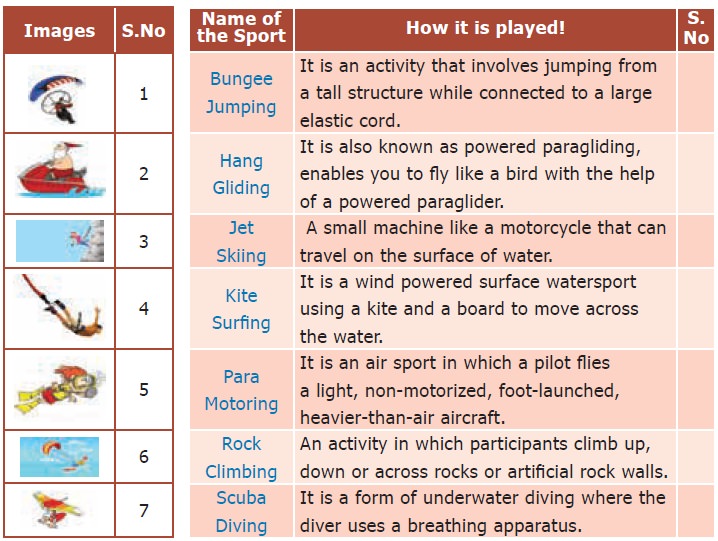
Now, read this hilarious anecdote from the life of a journalist
and enjoy.
1. In
1977, Mr .Nicholas Scotti,a journalist from San Francisco,fl ew from America to
Italy to visit some cousins.The plane stopped for an hour in JFK Airport in New
York. Mr Scotti thought he was at Rome Airport and got off the plane. Of course
his cousins were not there to meet him.
2. Mr.
Scotti spent two days in New york believing he was in Rome. In their letters
his cousins always talked about the traffic problems and the famous building in
Rome. Mr Scotti decided to find their home without their help.On his journey
round the city,Mr Scotti asked a policeman to tell him the way to the bus
station .Mr Scotti asked him in Italian .Luckily, the policeman was an Italian
from Naples, Italy and could reply in the same language.
3. On the
next day, after 12 hours of travelling round by buses, Mr Scotti was surprised
that the policemen and drivers speak in English. A policeman tried to tell him
that he was in New york, but Mr Scotti didn’t believe it and even got angry.
G. Complete the following table with information from the anecdote about Mr Scotti’s short trip.
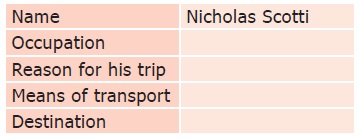
H. Circle the best option.
1. In New
York Mr Scotti left the plane because he thought he
a)
had to
change the plane.
b)
was in
Rome.
c)
had to
phone his cousins.
d)
changed
his mind.
2. He
decided to find his cousins’ home without their help. He asked the policeman
for information in Italian because he
a)
thought
he was in Italy.
b)
knew the
policeman.
c)
didn’t
speak any other language.
d)
liked the
language.
3. On the
next day, Mr
Scotti was __________ at how the
local people responded to his queries.
a)
surprised
b)
unhappy
c)
glad
d)
upset
4. Circle
three words that best describe Mr.Scotti
clever /
unlucky / stupid / successful / miserable / happy
I. Have you experienced any unexpected
turn of events in your life? What happened? How did you feel about it at that
moment? How do you feel about it now? Write an article for your school magazine
describing your experience in about 150 words.
_________________________________
_________________________________
_________________________________
_________________________________
_________________________________
Non-Finite Verbs

Finite verb:
Finite verbs change tense and number according to the subject.
Arun
invited Sujith to his daughter’s birthday.
Her
friends presented the girl with a toy.
His
friend presented a watch.
Non-finite verbs have no subject and do not change according to
the tense or number. Non-finite verbs are broadly classified as follows:
i.
Gerunds
1. Walking is a healthy habit(Present participle used
as a noun)
ii.
Infinitive
2. I like
to walk early in the morning. (to infinitive)
iii.
Present participle
3. These
are my walking shoes.(Present participle
used as an adjective)
iv. Past
participle
4. Having walked a long distence I felt tired
J. Look at the action words in bold. Identify whether they are either finite or non-finite verb.

Infinitives And Gerunds
The
infinitive is often called a ‘to verb’
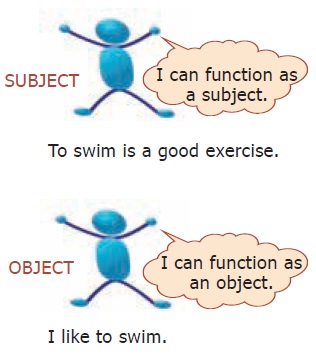
Infinitives
may be used without to and we call
such infinitives a plain infinitive or a bare infinitive.
Eg. She made me do my
project.
We use
plain/bare infinitives with these modals.

The
infinitive may function as a subject, direct object, subject complement,
adjective, or adverb in a sentence. Although an infinitive is easy to locate
because of the to+verb form, deciding
what function it has in a sentence depends on the meaning.
·
To wait
seemed foolish when decisive action was required.(subject)
·
Everyone wanted to go. (direct object)
·
His
ambition is to fly.
(subject complement)
·
He lacked the
strength to resist. (adjective)
·
We must study to learn.(adverb)
Gerunds
A gerund is an action word
that ends in –ing and functions as a noun
K. Read the following pairs of sentences
·
Travelling
might satisfy your desire for new experiences.
·
The study abroad
program might satisfy your desire for new experiences.
Identify the subject in the first sentence _______________ .
·
They do not appreciate my singing.
·
do not appreciate my assistance.
Identify the direct object in the first sentence
_________________
·
My cat’s favourite activity is sleeping.
·
My cat’s favourite food is salmon.
Identify the subject complement in the first sentence
______________
·
The police arrested him for speeding.
·
The police arrested him for criminal activity.
Identify the object of the preposition in the first
sentence________________
Dinesh
and Deepa have been assigned homework on non finites.They are not sure when to
use a gerund and when to use an infinitive. They decide to meet their teacher
and get their doubts cleared. The teacher introduces them to Mr.Gerund and
Ms.Infinitive.
L. You may role-play the conversation.
Teacher :
This is
Mr.Gerund.You may have seen him after these verbs ‘enjoy’, ‘finish’, ‘keep’,
‘mind’, ’suggest’, ’forgive’, ’excuse’, ‘postpone’,’go’
Gerund :
I come
after a Preposition too.
Teacher :
Mr.Gerund
comes in handy to describe a real action.
Infinitive :
Hello
friends, I am Infinitive. Words such as ‘like’, ‘refuse’ are followed by me.
Dinesh :
I know
you. I take your help to describe a general or future action.
(I think I need to get up early tomorrow to
complete my grammar exercise.)
Divya :
You have
helped me to express ‘reason’, ’intention’,’ purpose’.
(I wish to finish my assigment by tonight.)
Gerund :
Do you
know, after verbs like ‘begin’,’ love’,’ continue’, ‘try’, ‘learn’, ‘start’,
‘neglect’, you can use either of us?
Infinitive :
But
remember we mean different things when used after ‘stop’.
Dinesh :
Divya,When
we saw Rajesh at the mall, I stopped to talk to him.Why didn’t you wait?
Divya :
Don’t you
know I stopped talking to him?
Gerund :
I am also
used after these phrases –‘It’s no use ‘ , ‘It’s no good‘
Dinesh and Divya :
Thank you
, mam. Bye Mr.Gerund and Ms.Infinitive.
M. Now, work in pairs and help Dinesh and Divya complete the exercise given below.
Where are the astronauts headed to?
1. Write the gerund/infi nitive form of the verbs in the blanks.
1. The
astronauts managed ___________ (complete) their training in record time.
2. They
learned how __________ (survive) in space without gravity.
3. The
best astronaut almost quit _________ (try) to learn the complex information.
4. Their
mission appeared __________ (be) in jeopardy.
5. Then
Marina encouraged him by saying, "It’s no good __________ (quit) the
project right at the end."
6. Being
an astronaut will enable you __________ (achieve) great success in life.
7. If you
give up ____________ (study) now, our mission will be scrubbed.
8. Think
of your fellow astronauts who wouldn’t hesitate __________ (help) you in time
of trouble.
9. We
astronauts must keep on _______________ (prepare) for our space launch.
10. Some
say it’s no use _____________ (travel) to distant planets, because it takes too
long.
11. But
we really want ____________ (visit) other planets and fi nd out if life exists
on them.
12. Can
you imagine ___________ (walk) up to a Martian and shaking hands and
____________ (say), “Hello, how are you? “
13. We
really look forward _____________ (meet) alien creatures and ________ (fi nd)
out what they are really like.
14. Many
scientists have warned us not _____________ (take) this dangerous journey, but
we are not discouraged.
15.
Travelling to far away planets involves ____________ (risk) our lives for the
thrill of discovery.
16.
However we won’t delay ____________ (blast) off into space.
17. Would
you like __________ (accompany) us on our journey if you could?
18.
During our training we have got used to ___________ (be) weightless and
___________ (live) under diffi cult conditions.
19. Scientists
admit to __________ (be) intensely curious about life on other planets.
20. I’m
sure they would also enjoy __________ (travel) with our crew.
21. We
told them ____________ (come) with us on our trip, but some of them think it is
a waste of time ____________ (search) for life that doesn’t exist.
22. We
have been taught how __________ (endure) hardships during our training and now
we can’t afford __________ (waste) money.
We’re on our way!
Which planet are the astronauts heading to fi rst? Add the infi
nitives.
·
Neptune-10
·
Venus-09
·
Mars-18
·
Jupiter-11
Related Topics